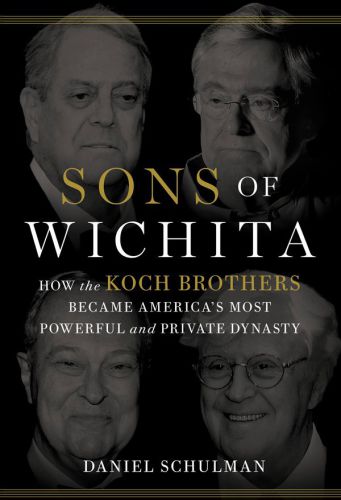
Sons of Wichita
How the Koch Brothers Became America's Most Powerful and Private Dynasty
کتاب های مرتبط
- اطلاعات
- نقد و بررسی
- دیدگاه کاربران
نقد و بررسی

Starred review from July 28, 2014
Mother Jones senior editor Schulman's group portrait of the amazingly wealthy, strong-minded Koch brothers is a critical, but surprisingly nuanced tale of money and influence. Casting new light on one of America's most ambitious families, this "unauthorized" biography will disappoint Koch haters. The Wichita-based Koch money (now totaling billions of dollars) comes from oil grown into a closely held conglomerate with a mixed environmental record. David and Charles have used their wealth to fund the libertarian Cato Institute and more recently, contribute to the Republican Party, and campaign against Obamacare and climate change. They have consequently been on the receiving end of White House enmity. Schulman concentrates on the family's intramural battles: the central conflict begins with an ugly 1985 lawsuit for control of the family money; the four brothers have battled each other in court for decades. Frederick, Charles, and fraternal twins David and Billâranging in age from 74 to 82âcome off as worldly, intelligent, accomplished, and difficult. This is a complex story of epic sibling rivalry, with important political dimensions.

June 15, 2014
Mother Jones senior editor Schulman delivers provocative reportage on the Koch alpha-family legacy.Patriarch Fred, a dedicated Kansan industrialist, rancher and entrepreneur, exercised a task-driven, "voracious work ethic." He was a founding member of the anti-communist John Birch Society and a pugilist, which meant that resolving disputes among his sons often involved gloved fisticuffs. Frederick, the oldest and most artistic, was an outlier gravitating away from the family business. He was soon followed by rebellious second son Charles and "pathologically competitive" fraternal twins David and Bill. Well before his father's death in 1967, Charles had already assumed authority over the successful family oil-refining business, which Fred left equal percentages of to three of his four sons (Frederick was disinherited due to numerous theft allegations) with the caveat that the bequeathal could be "either a blessing or a curse." Charles and David exerted a diligent "top-down control" with libertarian leanings in building the business into the country's second-largest privately owned multinational corporation. However, dissension in the ranks pitted brother against brother, as Schulman depicts in the second half. While the brothers' drive and dedication further fortified their father's empire, the Koch family portrait becomes less flattering as their ruthless, vicious infighting and litigiousness became commonplace. The author generously depicts the nasty retaliatory efforts by Charles in response to flashy "Wild Bill's" numerous efforts to gain his own foothold in the business and against hermetic, reclusive collector Frederick when he refused to relinquish company shares. Now billionaires, Charles' and David's strategic, manipulative political contributions, Schulman notes, have also garnered negative notoriety for personifying the nation's wealth inequality-most notably, in the 2012 presidential election, where they emerged as "cartoonish robber barons" bankrolling the tea party movement. Free from conjecture or personal criticism, Schulman's astute account is buttressed by concrete research, legal documents, and verbatim interviews with family members and friends. A straightforward, evenhanded and often riveting assessment.
COPYRIGHT(2014) Kirkus Reviews, ALL RIGHTS RESERVED.

December 1, 2013
Mother Jones senior editor Schulman aims for a rounded biography of the brothers who built the family's oil and cattle empire into America's second largest private corporation, then nearly lost it to feuding.
Copyright 2013 Library Journal, LLC Used with permission.

























دیدگاه کاربران